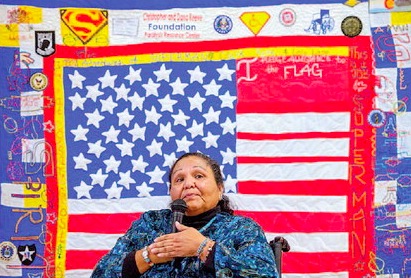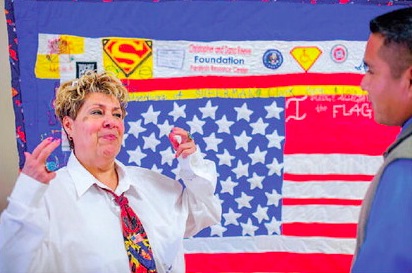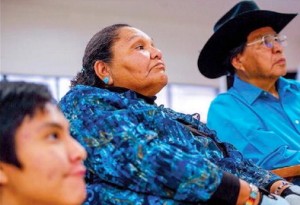
Cable Hoover/Independent
Cecelia Fred sits in front of a quilt that was made in her honor as she gives a speech during a luncheon at the San Juan Center for Independence in Gallup Wednesday.
Flag quilt salutes local disability rights advocate
By Jeff Goodman
Staff writer | Gallup Independent
GALLUP — Cecelia Fred can’t fly. She lacks superhuman strength and speed. She doesn’t have X-ray vision, invulnerability or a red cape.
But to family, friends, co-workers and residents throughout the Southwest, she’s more of a Superman than the Man of Steel ever could be.
Fred, who has dedicated her life to advocating for the rights of people with disabilities, was presented with a handmade Superman-themed flag quilt during a ceremony to celebrate her accomplishments Wednesday afternoon outside the San Juan Center for Independence at Rio West Mall in Gallup.
The flag will be donated to the Christopher and Dana Reeve Foundation, which seeks to improve quality of life for people with paralysis and other mobility challenges. The late “Superman” actor’s nonprofit group was chosen to receive the gift because Fred, 58, serves as one of its ambassadors.
“She stands up for her rights,” Marie Dean said of her sister, who uses a wheelchair. “We always look up to her.”
Added her brother, Amos: “Here you have someone who doesn’t make disability an issue.”
Well, perhaps in her own life. When it comes to her peers, she goes to great lengths to hear their stories, defend their rights and celebrate their triumphs.
Throughout the event, loved ones and colleagues offered examples of Fred’s influence and impact.
“She’s the grandmother of disabilities on the Navajo Nation,” said Ken Collins, director of the local San Juan Center branch. “None of us would be here if it weren’t for Cecelia Fred.”
Stitched together
The quilt that was presented to Fred had been in the works for months.
This past spring, Cecilia Quintana got involved with the San Juan Center and wanted to put her creativity to use.
What started with a few scraps of fabric turned into an elaborate centerpiece recognizing her friend, and the American flag became the centerpiece of a quilt that teems with symbolism.
There are markers for each of the Four Corners states — New Mexico, Arizona, Utah and Colorado — to represent Fred’s work throughout the region.
There are patches and designs to showcase the organizations that have benefited from Fred’s efforts, including branches of the United States Armed Forces and the Native American Disability Law Center.
And there are numerous references to Clark Kent’s alter ego, the S-shield accompanying several famous lines from the superhero omnibus.
In one section: “Look, up in the sky.”
On another swath: “Faster than a speeding bullet.”
Down the right side: “This is a job for Superman.”
Quintana explained the meaning of each element of the quilt, which hung from a wooden stand that was decorated with four wheelchair wheels. The back side features a traditional Circle of Life blanket.
“This is all to honor Cecelia,” she said.

Cable Hoover/Independent
Cecelia Quintana, left, explains to Echohawk Lefthand how she made a flag and quilt to honor her friend Cecelia Fred in Gallup Wednesday.
Shows of courage
It’s heartbreaking for Fred to think back on her life before disability.
She used to hike, herd sheep and ride horses. Her family had neither running water nor electricity, but she could roam free.
Then, when she was 6 years old, everything changed in a split second. Her uncle accidentally shot her in the neck, damaging her spinal cord. The horrific incident meant that Fred, even after multiple surgeries, would spend the rest of her life in a wheelchair.
She spent many months rehabbing in Colorado, away from her loved ones, away from the sounds of her native language.
When members of her family came to visit, she didn’t recognize them. “I thought my doctors and nurses were my mom and dad,” Fred said.
She was relieved to be discharged. But then she learned that her local school didn’t have the amenities to support her, she was forced to attend boarding school in northeastern Arizona.
She was frequently the subject of jokes and jeers.
“Kids, they always find ways to put people down,” said Amos, who attended boarding school with Fred for two years. “Being called names, she had to be strong to deal with that.”
For Gloria Skeet deCruz, Fred’s disability always stuck in her mind. In her youth, on her way to school, the current Baahaali chapter manager would often see Fred boarding a handicap-accessible bus.
“I always wondered who that person was,” deCruz said.
‘Motherly warmth’
That person was a champion- to-be of disability rights.
After working as a silversmith in her late teenage years, Fred began her decades-long career in social advocacy.
She’s petitioned federal, state and Navajo agencies for better conditions — not just for paraplegic people, but also for people with other physical and mental disabilities.
Her life took on even greater meaning when she became a mother.
When her youngest son Chad was about 4 years old, he asked her why she was in a wheelchair. She avoided answering him for two years.
Once, Chad recalled, he saw his mother crying on her bed and asked her what was wrong.
“She thought she was going to give up,” he said. “She said, ‘It’s because I’m like this.’” But Fred didn’t give up.
She put her silversmithing skills to use again and founded the Precious Life Foundation, a nonprofit through which she taught people with disabilities how to make and sell jewelry.
And she continued traveling throughout the region to support people with disabilities in ongoing efforts to pass legislation, bolster accessibility and debunk stereotypes.
“She doesn’t have the legs to walk around, but she’s hardworking,” Chad said. “She gets up to work every day.” She does it because she believes her experiences can bring about positive changes.
In 2005 she became a VIP — a voice for injury prevention — with ThinkFirst Navajo, a project through the Farmington based Eve’s Fund for Native American Health Initiatives that was established to address vehicle and bicycle safety as well as domestic violence, substance abuse and other avoidable trauma.
Fred has shared her story with hundreds of students in the region, urging them to wear seat belts and helmets and teaching them how to take safety precautions in their daily lives.
“She has that motherly warmth and that gentle, soothing voice,” said Echo Lefthand, director of the ThinkFirst Navajo program. “The kids really listen to her.”
Coincidentally, Lefthand said, he often discusses the American flag when he visits with area students. The red represents courage and bravery, he tells them. The white symbolizes clarity in mind and body. The blue stands for perseverance.
And the stars? “Sometimes you get lost,” he said, “and the stars help orient you and give you direction. … Cecelia embodies all of those qualities.”
‘Superman’ efforts
When she isn’t working at the San Juan Center as an independent living specialist, Fred is an active spokeswoman for the Christopher and Dana Reeve Foundation.
She speaks on behalf of the New Jersey-based nonprofit organization to honor the legacy of the late “Superman” actor, who became a quadriplegic after being thrown from a horse in a 1995 equestrian competition. Before dying of heart failure in 2004 at the age of 52, Reeve lobbied for research in treatments for spinal cord injuries.
Building on his efforts, Fred and the Reeve Foundation continue raising money and awareness. According to its website, the foundation has distributed more than $17.6 million since 1999 to outreach, advocacy and care organizations.
“She never took her disability as a problem — she looked at it as something to work with,” her sister said. “She was strong. I’m very proud of her.”
At 10 a.m. Oct. 3 — almost exactly a decade after Reeve’s death — Fred will present the flag quilt to a foundation representative at the Stand Down for Homeless Veterans event at the Gallup Community Service Center.
At the Wednesday ceremony, before guests approached the pizza, sandwiches, salad, chips, cake and beverages that were laid out three long tables — one of which was adorned with a plastic Superman- themed cover — they watched a short video clip about Fred’s experiences.
Then they listened as the guest of honor gave an emotional speech, offering words of inspiration.
“My body gets tired sometimes,” she said. “But I don’t think my work is done. I’m going to keep going. I’ll stop when my body wears out.”

Cable Hoover /Independent
Cecelia Fred sits with her husband Jimmy James, right, and her son Chad Fred during a luncheon honoring her at the San Juan Center for Independence in Gallup Wednesday.
This article appeared in the Gallup Independent on October 2, 2014 and is being republished here with permission from the author.

